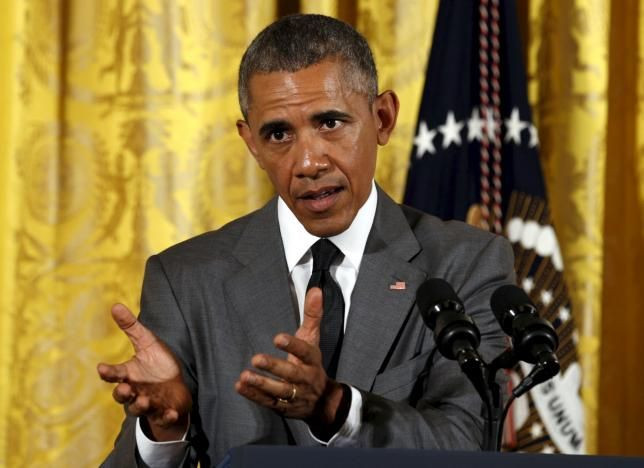Obama Faces New Dynamic With Europe At G7 Summit In Germany

When President Barack Obama attends the Group of Seven summit in Germany on Sunday, he will join fellow leaders who are growing accustomed to a new dynamic in the transatlantic relationship: less direction from Washington, more demands on Europe.
In responding to Russia's intervention in Ukraine, the crisis in Libya and efforts to advance Middle East peace, European leaders have stepped up their role after a real or perceived sense that the United States was drawing back.
The shift has created both annoyance and satisfaction among European officials.
Some privately express frustration at what they view as reluctance by the Obama administration to get involved.
They contrast a "leading from behind" strategy in the Middle East and Europe with the more proactive U.S. stance in Asia, where Obama is acting diplomatically and militarily to counter growing Chinese influence.
France has publicly berated the U.S. administration for not launching air strikes in 2013 against Syrian President Bashar al-Assad. It said that the decision caused irreparable damage to the Syrian opposition on the ground and emboldened Russian President Vladimir Putin on the international scene.
"At the heart of what’s going on is that the Americans themselves don’t want to be on the front line in this region" a senior French official said. The phrase "leading from behind" grew out of the 2011 NATO intervention in Libya when Washington let France and Britain do most of the heavy military lifting.
DIVISION OF LABOR
Other diplomats and U.S. officials say France and Germany's leading role in talks between Moscow and Kiev, which led to a shaky ceasefire deal in eastern Ukraine, was appropriate for a crisis that hits them closer to home.
"It's not a question of ceding responsibility, it's the natural division of labor between us," said David O'Sullivan, the European Union's ambassador to the United States.
Other areas, however, have been hurt by a lack of U.S. leadership, foreign policy analysts said.
Stephen Hadley, Republican President George W. Bush's national security adviser, said it was very attractive to Russia not to have the United States at the table in the Ukraine ceasefire talks. He noted that Europeans were eyeing a new approach to peace between Israelis and Palestinians by potentially backing a U.N. resolution for a Palestinian state.
"Overhanging this, of course, is this perception of American disengagement and stepping back from leadership on a lot of problems in the world, which is a perception that our Arab friends and allies have in the Middle East and, you know, I think is very much prevalent in Europe," he said.
"STRONG ALIGNMENT"
The White House rejects that charge, which is voiced by many Republican critics. It points to U.S.-European unity on Iran's nuclear program, global climate change negotiations, strikes against Islamic State militants, and sanctions against Russia.
"If you look at the president’s key foreign policy priorities, every single one of them, just about, is supported by these key European partners," Obama's deputy national security adviser Ben Rhodes said. "I think this is a moment of very strong alignment with Europe."
That alignment has not translated into pro-American sentiment in Germany, which is hosting the G7 summit. Germans remain angry at U.S. spying practices, an issue German Chancellor Angela Merkel has raised repeatedly with Obama.
In an effort to set a more positive tone, Obama and Merkel will spend some public time together before the summit on Sunday, walking around a small village and sampling local food.
The United States has openly talked about the need for Europe to step up militarily and has recently reiterated a long-standing message that its NATO partners must boost their military spending.
(Additional reporting by John Irish in Paris and Louis Charbonneau in New York; Editing by Mark Trevelyan)
© Copyright Thomson Reuters 2024. All rights reserved.





















